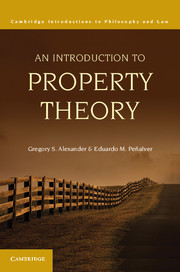2 - Locke and Libertarian Theories of Property
Published online by Cambridge University Press: 05 June 2012
Summary
No single person has had more of an impact on property thought in the English-speaking world than John Locke. Among contemporary theorists, however, Locke’s influence is felt most directly among property rights libertarians. This is somewhat ironic, because these libertarians are able to rely on Locke only by excising from his theory several of its foundational elements. In this chapter, we will describe the outlines of Locke’s theory and explore some of the debates over its cogency and meaning.
LOCKE’S CONTEXT
Locke’s theory of property is laid out in his Two Treatises of Government, with the bulk of the relatively brief discussion appearing in the fifth chapter of the second treatise. (There are, as we will see, important elements of his discussion in the first treatise as well.) In thinking about Locke’s theory, it is helpful to understand something about the debates in which he likely understood himself to be participating. Although the Two Treatises was not published until 1689, in the immediate aftermath of the Glorious Revolution, most commentators agree that the work was actually written several years earlier, between roughly 1679 and 1682, during the Exclusion Crisis, in which the Whigs, led by the First Earl of Shaftesbury (Locke’s patron), attempted to prevent the Catholic James, Duke of York, from inheriting the throne.
- Type
- Chapter
- Information
- An Introduction to Property Theory , pp. 35 - 56Publisher: Cambridge University PressPrint publication year: 2012



